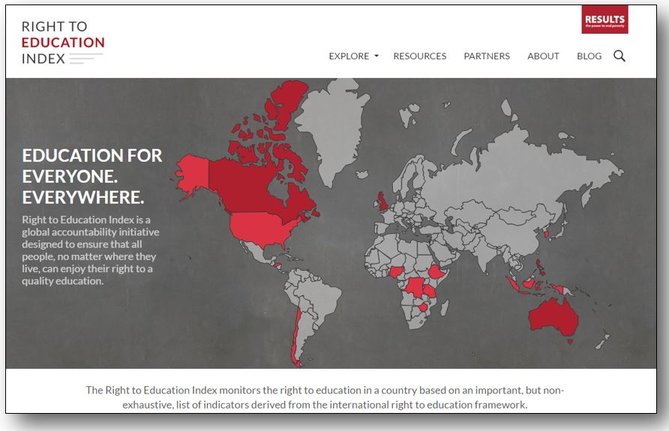Right to Education Index releases new data and advocacy strategies
RTEI is a biennial project with civil society advocates collecting data using the RTEI Questionnaire in one year and developing advocacy strategies in the second year, to support national fulfillment of the right to education. In 2016, 15 partners completed the RTEI Questionnaire and 5 partners are implementing advocacy strategies using this data.
RTEI 2016 Data is live on RTEI.org
In 2016, 15 civil society partners, 29 independent peer reviewers, and 3 government officials reviewed and completed the RTEI 2016 Questionnaire. The Questionnaire consists of five themes (Governance, Availability, Accessibility, Acceptability, and Adaptability). Index scores are derived by the average of theme scores. Theme scores are an average of subtheme scores, which are calculated by averaging representative data points. Further information about calculations is available here and will be detailed in a forthcoming RTEI technical brief.
RTEI 2016 Findings
In 2016, RTEI found that Australia, Canada, and the UK had the most robust framework for the right to education across the five themes represented in RTEI. Australia’s, Canada’s, and the UK’s scores were highest on Availability, reflecting the infrastructure and resources of schools, including textbooks, sanitation, classrooms, and pupil-per-trained teacher ratios. On the Index’s other end, Chile, the DRC, and Zimbabwe struggled to satisfy indicators monitored in RTEI 2016. These countries had low Acceptability or Adaptability scores, signifying weaker education systems and difficulty addressing progressively realized rights, such as the rights of children with disabilities. For all RTEI 2016 participating countries, the lowest scoring theme was Adaptability, focused on education for children with disabilities, out-of-school children, and out-of-school educational opportunities. Outside of Adaptability indicators, the Classrooms subtheme had the lowest average score of all Availability subthemes across all countries because of the lack of infrastructure data available in RTEI 2016 and high pupil-per-classroom ratios in several countries.
RTEI 2016 also included an analysis of education financing given increase attention to equitable resource allocation and access worldwide.
RTEI 2017 Advocacy Partners
All eligible RTEI 2016 partners submitted applications for 2017 Advocacy Strategies using RTEI 2016 results. After thorough internal and external review of proposals, 5 were selected. 2017 Advocacy partners include:
- Honduras – Foro Dakar
- Indonesia – New Indonesia
- Palestine – Teacher Creativity Center
- Tanzania – HakiElimu
- Zimbabwe – Education Coalition of Zimbabwe
Advocacy partners will partner with global networks and organizations, called Global Partners in RTEI 2017, to enhance national strategies. Global partners include the Global Campaign for Education, Education International, RESULTS International Australia, RESULTS Canada, RESULTS UK, and the Right to Education Project. Be on the lookout for in-country advocacy updates from our partners posted on the RTEI blog.
RTEI 2017 Partners Meeting
In March, 20 RTEI partners and advisors convened in Jakarta, Indonesia for the 2017 Partners’ Meeting. Much of the meeting focused on advocacy strategies and rights-based approaches. These included SDG 4 shadow reporting, UPR submissions, LEG engagement, Parliamentary engagement, VNR reporting, and engaging media. Participants led sessions based on their expertise and national experiences, drawing on past advocacy strategies to discuss best practices and potential avenues for future advocacy.
March 24, the final day of the meeting, showcased NEW Indonesia’s national report launch. NEW Indonesia hosted 120 people including international partners, ministry officials, media representatives, and students. The launch included presentations from Indonesian and international researchers about RTEI and the right to education in Indonesia. Presenters included Doni Kusuma A, M. Ed, an education analyst from Pendidikan Karakter; Zulkifli Jumelin, MIDA, a research from Network for Education Watch Indonesia; Ir. Hendarman, Head of Research and Policy at the Ministry of Education and Culture; Dr. Hayadi from the Research and Development Institute at the Ministry of Religion; and Ally Krupar of RESULTS Educational Fund. The session was moderated by Nur Hidayatus Syarifah, S.Pd, a Teacher and Public Speaker.
Indonesian media highlighted the event in the Jakarta Post, Detik News, and Republika News. Click here for the 2017 RTEI Partners’ Meeting Report.
